Jennifer Flanders's Blog, page 33
August 18, 2013
Recipe for a Happy Marriage
 My husband and I celebrated yet another wedding anniversary last week — our 26th.
My husband and I celebrated yet another wedding anniversary last week — our 26th.
Marriage has been every bit as sweet and satisfying as I always dreamed it would be. My husband is my best friend, and I love getting to live life with him, sharing moments and making memories together. I feel incredibly blessed to be wed to such an amazing man.
Even so, staying married – and happily so — has taken much more work than either of us ever imagined.
Building a happy marriage is an ongoing process. It’s not something you can power through once, then check off your to-do list. There’s no propping your feet up and saying, “That’s done. Now I can move on to a different project.”
Marriage is a dynamic relationship. If a husband and wife are not drawing closer, they’re drifting apart. If their love isn’t waxing, it’s waning. If their passion’s not heating up, it’s growing cold.
There is no automatic pilot, no cruise control, no steady state, no mindless maintaining of the status quo.
Living “happily ever after” is not a given. It takes purpose and persistence, planning and prioritizing. If I want a happy marriage, then I must work to make it happy, each and every day.
Getting married is easy. Staying married, not so much.
A lot of couples expect marriage to be a piece of cake. When they discover otherwise, many want to throw in the (dish)towel and get out of the kitchen.
They forget that even a piece of cake takes time, attention, and know-how. The very best cakes (like the very best marriages) are made from scratch with fresh ingredients, carefully measured, skillfully mixed, and beautifully decorated.
Do you want a happily-ever-after marriage? It will require a lot of love and commitment, self-sacrifice and mutual respect, patience, forgiveness, friendship, and tender affection (refer to recipe below). God will supply the ingredients, but you’ve got to furnish the labor yourself.
You really can have your cake and eat it, too, but only if you stay in the kitchen and keep on baking.

[click on image to download free printable file]








August 6, 2013
Don’t Let Anything Steal Your Joy
 Joy springs from a grateful hearts, but there are two things that will snuff out gratitude faster than blowing out a candle, and we must vigilantly guard against both.
Joy springs from a grateful hearts, but there are two things that will snuff out gratitude faster than blowing out a candle, and we must vigilantly guard against both.
Those two things are envy and expectations.
Envy causes us to see the glass as half-empty instead of half-full. It fills our hearts with jealousy and bitter resentment, so that we begrudge others the good things they enjoy and pity ourselves for not sharing the same fate.
Nothing will blind you to your own blessings more effectively than moping over what you lack, rather than rejoicing over what you have. When you can’t even recognize or acknowledge the good things in your life, then you certainly won’t feel proper appreciation for them.
Expectations can deal as serious a deathblow to gratitude as envy does, for expectations give rise to a sense of entitlement. You can’t sincerely appreciate anything if you think someone owes it to you. It is impossible to feel truly grateful for something when you’re convinced you deserve it.
Expectations have destroyed a lot of marriages, and it’s not difficult to understand why.
Imagine for a moment that it’s your anniversary. Your husband brings you flowers… but you were hoping for diamonds. You’ve been hinting for weeks and had even left a marked catalogue on his desk. Doesn’t he know this is the year for diamonds? He probably just bought these flowers at the grocery store on his way home from work. What a slacker! Can’t he ever plan ahead? Why are special occasions always an afterthought with him?
Before long, you’re really miffed. Your husband can see this in your eyes, sense it in your tone of voice—and it stings. He does something nice for you, and this is how you react? Whatever happened to a simple thank you? Why does he even bother trying? He stews until he’s boiling, then spends your wedding anniversary sleeping on the couch.
Life doesn’t have to be like this.
Let’s try that scenario again, but this time when your husband brings home flowers, you are delighted. He’s been so busy at work lately, you’re surprised he remembered your anniversary at all. What a sweetheart! You hug his neck, give him a long kiss, and thank him profusely. You arrange the bouquet in water, set it on the table, and stop to admire it every time you pass. Your husband sees you do this and smiles with pleasure. You comment on how beautiful the flowers look, how wonderful they smell, and how blessed you are to be married to such a sweet and thoughtful guy— not just tonight, but repeatedly throughout the week.
The question is, which wife will you choose to be? Which would your husband rather come home to?
Do you want joy? Then rid yourself of envy and expectations and any notions of entitlement.
Do you want to live happily ever after? Then cultivate a heart filled with gratitude — first to God, from whom all blessings flow, but also toward the people He has placed in your life. People whose kindnesses, whether great or small, should never be taken for granted.








August 1, 2013
Pray for Your Husband from Head to Toe
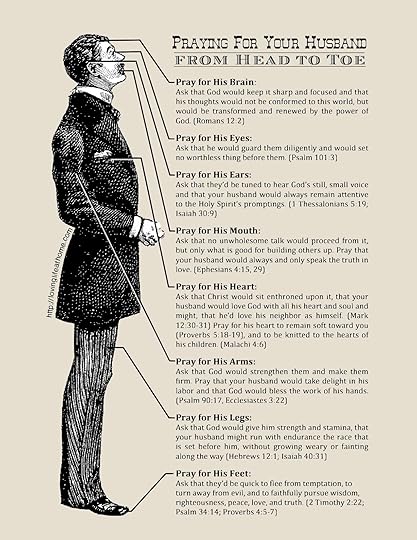 Ruth Bell Graham advises wives to “tell your mate the positive, and tell God the negative.” Take your concerns to God. Faithfully lift up your husband in prayer every day, and you will likely notice a transformation not only in him, but in yourself, as well.
Ruth Bell Graham advises wives to “tell your mate the positive, and tell God the negative.” Take your concerns to God. Faithfully lift up your husband in prayer every day, and you will likely notice a transformation not only in him, but in yourself, as well.
Of course, we needn’t wait until there is some problem or disagreement before beginning this practice. A wife can and should routinely intercede on her husband’s behalf. Prayer should be a habit of life, something we do continuously and “without ceasing.” (1 Thessalonians 5:17)
There are many different daily, weekly or monthly plans available that can help make praying for your husband more systematic, but one of my favorites is praying for your spouse from head to toe. I heard about this concept several years ago. What follows is my own take on it, plus a free printable version you can use in your personal prayer time.
Pray for His Brain:
Ask that God would keep it sharp and focused and that his thoughts would not be conformed to this world, but would be transformed and renewed by the power of God. (Romans 12:2)
Pray for His Eyes:
Ask that he would guard them diligently and would set no worthless thing before them. (Psalm 101:3)
Pray for His Ears:
Ask that they’d be tuned to hear God’s still, small voice and that your husband would always remain attentive to the Holy Spirit’s promptings. (1 Thessalonians 5:19; Isaiah 30:9)
Pray for His Mouth:
Ask that no unwholesome talk would proceed from it, but only what is good for building others up. Pray that your husband would always and only speak the truth in love. (Ephesians 4:15, 29)
Pray for His Heart:
Ask that Christ would sit enthroned upon it, that your husband would love God with all his heart and soul and might, that he’d love his neighbor as himself. (Mark 12:30-31) Pray for his heart to remain soft toward you (Proverbs 5:18-19) and to be knitted to the hearts of his children. (Malachi 4:6)
Pray for His Arms:
Ask that God would strengthen them and make them firm. Pray that your husband would take delight in his labor and that God would bless the work of his hands. (Psalm 90:17, Ecclesiastes 3:22)
Pray for His Legs:
Ask that God would give him strength and stamina, that your husband might run with endurance the race that is set before him, without growing weary or fainting along the way (Isaiah 40:31; Hebrews 12:1)
Pray for His Feet:
Ask that they’d be quick to flee from temptation, to turn away from evil, and to faithfully pursue wisdom, righteousness, peace, love, and truth. (2 Timothy 2:22; Psalm 34:14; Proverbs 4:5-7)
So that’s the whole plan. It takes only a few minutes to cover your husband in prayer from head to toe. Can you imagine the benefits you both will reap if you’ll make it a habit to pray this way for your spouse every day?








July 29, 2013
Want to Have a Happy Home?
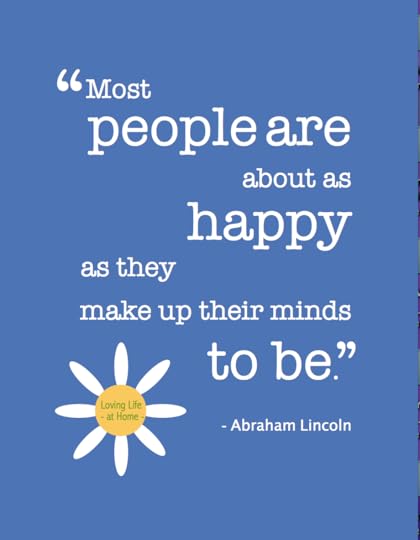 Martha Washington once noted, “The greatest part of our happiness depends on our dispositions, not our circumstance.” And she was right.
Martha Washington once noted, “The greatest part of our happiness depends on our dispositions, not our circumstance.” And she was right.
Did you know that whether or not your home is a happy one largely depends on… you?
As wives and mothers, we have the power to transform our homes from what might have been a vortex of negativity and darkness and despair into a refuge of joy and radiance and hope. Shouldn’t we be using that power for good?
The answer is yes. Yes, we should.
Our outlook on life has a profound effect not only on our own happiness, but on the happiness of our husband and children, as well. We have a duty to our families to maintain as cheerful an outlook as possible. We do our loved ones a grave disservice when we cultivate a perpetually sad or sour disposition.
Such a disposition has little to do with life circumstances, and everything to do with choice, for as Abraham Lincoln once noted, “most people are about as happy as they make up their minds to be.”
When I say that wives should “choose joy,” I am not suggesting that we be dishonest, “fake,” or insincere. Being joyful is not about smiling on the outside when we are shattered on the inside. It is not about pretending that life is hunky-dory when serious problems exist and we need help.
Choosing joy is not about putting on a show for another person’s sake. It is about changing the way we look at things — for our own sake.
Being joyful is not about repressing feelings, but about attacking negativism at the root — in our heart and mind and attitudes. It is about being selective in our thoughts.
In every circumstance in life, there can be found something good, as well as something bad. Being joyful is about choosing to dwell on the good instead of on the bad. It’s about being grateful for what we have instead of upset over what we don’t.
That Scripture repeatedly urges us to rejoice implies that joy is indeed a choice:
• “Rejoice in the Lord always; again I will say, rejoice!” (Philippians 4:4)
• “Always be joyful.” (1 Thessalonians 5:16, NLT)
• “Consider it all joy, my brethren, when you encounter various trials, knowing that the testing of your faith produces endurance.” (James 1:2-3)
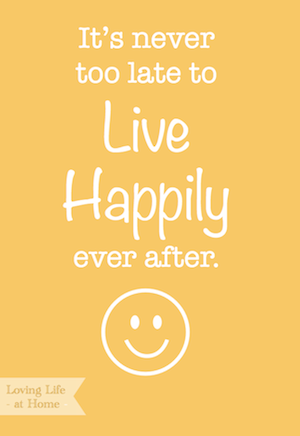
This sort of constant, abiding joy has at its root an outward rather than an inward focus. It asks not, “What can others do to make me happy,” but “what can I do to make others happy?” Personal happiness is seldom the result of the former mindset, but it is a natural byproduct of the latter.
Showing kindness to others and doing things to bring happiness to those around us is one of the surest ways to find happiness ourselves.
As Helen Keller so wisely observed, “Happiness cannot come from without. It must come from within. It is not what we see and touch or that which others do for us which makes us happy; it is that which we think and feel and do, first for the other fellow and then for ourselves.”
You want to live happily ever after? It’s never to late to begin. The choice is yours; choose joy.








July 21, 2013
Grace for the Undeserving

Sometimes showing grace to others is easy. The person in need of grace is someone we like, someone who is naturally sweet, someone who’s normally very easy to get along with.
Sometimes, though, extending grace is a challenge. Some folks are difficult, demanding, and inconsiderate. Some take advantage of others. Some are disagreeable. Some cut us off in traffic. Some are just plain rude.
They don’t deserve grace, we may think to ourselves.
But, then again, neither do we.
Yet grace is exactly what God has given. In fact, He has lavished it upon us. (Ephesians 1:7-8)
It is not something we’ve earned. It’s not something we deserve. He gives it freely, because he loves us deeply.
In turn, God expects us to demonstrate that same grace in our dealings with others.
And that includes those cranky, cantankerous, “undeserving” types, too. Often, they’re the ones who need it the most. We need to demonstrate grace to the “undeserving” or unappreciative, not only for their benefit and blessing, but our own, as well.
But how do we go about it? How do we extend grace when doing so may be completely out of sync with our natural reaction in a given situation?
We do it by praying for God’s help and by following Christ’s example. (Philippians 2:1-15) Scripture spells this out for us:
G = Grant forgiveness freely
Harboring grudges and resentments doesn’t hurt the target of our bile and bitterness nearly as much as it hurts our own health and wellbeing. We must learn to let things go and move on, for our own sake as well as for the people around us. God has forgiven us an insurmountable debt. So must we forgive others. (Matthew 19:21-35)
R = Remain patient at all times
We shouldn’t allow the words or actions of others to inflame us. Instead, we must stay steady. Think clearly. Remain calm. The Bible teaches that patience is a mark of wisdom (Proverbs 19:11). We are told to “count it all joy” when we encounter trials, knowing that such difficulties mature us and build our patience and endurance. (James 1:2-3)
A = Answer evil with good
We must resist the urge to repay tit for tat. “Getting even” is not a godly mindset, it just escalates and perpetuates the conflict. Instead, we should “bless those that curse you and pray for those who despitefully use you.” (Luke 6:28-29) We should not return evil for evil (Romans 12:17), but should treat others the way we’d like for them to treat us. (Luke 6:30)
C = Consider others’ viewpoints
There may be contributing factors to their behavior of which you are unaware. Put yourself in their shoes, not to justify another’s wrong actions, but to help you better understand underlying causes so that they can be effectively addressed. Examine your own heart, attitudes, and actions in the matter. Have these contributed to the problem you are facing? If so, ask their forgiveness and do what you can to make amends. (Matthew 5:23-24)
E = Exemplify Christ’s love
“Let everything be done in love.” (1 Corinthians 16:4) Love is our standard. It is patient, kind, and longsuffering. (1 Corinthians 13) We should love, because God first loved us. (1 John 4:19). Love and grace are inseparable.
But showing grace to others does not mean we must sweep problems under the carpet and pretend they don’t exist. Wrongful behavior needs to be addressed, and it may sometimes fall on us to do it (especially for those of us who are mothers with young children still at home). Yet in the midst of addressing such difficulties, we must pray for wisdom, then speak the truth in love (Ephesians 4:15) with sincere humility.
This is the path grace marks out for us — even when dealing with the most difficult cases — and it is our best hope for resolving conflicts in a way that honors God by communicating His love and grace to those around us.
This article was originally published at Laundry Moms as part of their ongoing study, 31 Days of Grace. I encourage you to check out the entire series… and be blessed.








July 7, 2013
Girl Power: Don’t Waste It
 We hear a lot about female empowerment these days…but how should we define it? What does an empowered woman really look like?
We hear a lot about female empowerment these days…but how should we define it? What does an empowered woman really look like?
Is she wealthy? Is she world-famous?
Does she radiate prestige? Does she command the respect of her peers? Does she carry political clout?
Is she her own woman? Completely autonomous? Answers to no one?
Is girl power something she wears like a badge? Or wields like a weapon?
Would we even recognize an empowered woman if we met her on the street?
Maybe. Maybe not.
In the past half-century, women have spent so much time focused on fighting for equality and closing the perceived gender gap that much of the very real power unique to our sex has been lost: relinquished, squandered, forgotten, or ignored.
But it doesn’t have to be that way. Girls are smart. We have brains. We can think.
And when we notice — as of late so many have — that the proverbial baby has been tossed out with the bathwater, we have sense enough to retrieve it. We can learn from past mistakes — both the mistakes we’ve made individually, as well as the mistakes made by the generations ahead of us — and change course as needed.
The battle for sexual equality has morphed into a full-blown attack on common sense and decency. Regardless what popular pundits of feminism may argue, being equal in worth and value is not the same as being identical in nature and function.
There are (by design) some very real, very wonderful differences between men and women. True power comes not by denying such differences exist, but by embracing those differences with gratitude and grace.
An empowered woman INSPIRES those around her.
It is no secret that girls typically outperform boys on verbal tests. Women are communicators at heart. We are relational to the core. We are good with words.
But words can be used to help or to hurt. To encourage or to tear down.
An empowered woman understands this fact and chooses her words carefully. She is not catty, caustic, or overly critical, nor does she curse like a sailor. That’s merely rudeness masquerading as power.
A hurricane makes a great show of brute force, but look at the destruction, devastation, and despair that follow in its wake. Gentle spring rains may never make headline news, but they pack a potency we’d do well to emulate — the power to refresh and rejuvenate, to nurture and nourish, to bring life and growth and beauty.
It takes sustained strength and directed determination to build up rather than destroy. To teach by example. To encourage. To bring out the best in others. To inspire those around us.
This is real power. It is a power each one of us possesses. A power that women, with our communicative tend-and-befriend natures, are especially well-suited to employ — if only we’ll purpose to do so.
“Our chief want is someone who will inspire us to be what we know we could be.”
― Ralph Waldo Emerson
An empowered woman INVIGORATES the opposite sex.
As the mother of eight boys (and a casual observer of their many friends), I cannot help but notice the effect feminine company has on a group of guys. When fellas know that girls are watching, they will run faster, play harder, and push themselves further than they’d ever do without such an audience.
That’s because they are hard-wired to want to woo a woman and win her attention and affection.
When a girl first starts to sense the sway she holds over guys, it can make her feel a little heady. At that moment, she faces a choice: What will she do with this newfound power?
Some will choose to misuse and abuse it. When that happens, everybody suffers.
One of the most devastating effects of the sexual revolution is that it has duped girls into believing they can use their sexual power indiscriminately, without diluting its effectiveness or damaging themselves (and others) in the process.
That is a lie.
It is a lie that has cheated many women out of the things they most desire in life: good health, lasting love, a stable marriage, a happy home, and bright, beautiful, well-adjusted children.
An empowered woman doesn’t squander her sexuality. She understands what is at stake. She respects her power — and she respects herself – enough to use it wisely. She guards it. She protects it. She cherishes it.
She says no to sex before marriage and yes to sex within marriage. When the circumstances are right, she channels all that vivacious energy into one man — her husband. And in doing so, she not only blesses her spouse, but she benefits herself, her family, and society as a whole in myriad and magnificent ways.
“What you do makes a difference, and you have to decide what kind of difference you want to make.”
― Jane Goodall
An empowered woman INCUBATES new life.
Bearing children is certainly not the only thing a woman can do, but only a woman can do it. Only a woman can conceive, carry, and give birth to the next generation. This is a power that has been completely denied to men.
Granted, men are necessary for conception to occur, but it is within the womb of a mother that new life begins, that each tiny human is knitted together. As women, we are given the privilege of participating in this miracle of creation.
There are many who have fought long and hard to give pregnant women the power to choose death, but the far greater power lies in our ability to choose life.
An empowered woman values life. She recognizes life for the gift it is, a gift that she willingly passes on to her children, even at great personal sacrifice.
If you are reading this article now, it is because your mother chose LIFE for you. And if you are pregnant now — even if the circumstances surrounding your pregnancy are less than perfect — you in turn can choose LIFE for your little one.
This is what my husband’s mother did for him, although her situation at the time was far from ideal. Carrying him to term was not an easy choice (nor was placing him for adoption as soon as he was born), but it was the best and bravest choice she could make, and one for which our entire family is eternally grateful.
“I have set before you life and death, blessings and curses. Now choose life, so that you and your children may live…” – Deuteronomy 30:19
An empowered woman IMPACTS future generations.
Of course, giving birth is just the beginning. As one philosopher observed, “The moment a child is born, the mother is also born. She never existed before.”
Motherhood has a way of modifying how a woman thinks, of altering what she values. Things that may once have seemed extremely important will often lose significance once a baby enters the picture — not because the things themselves have changed, but because she has.
An empowered woman is okay with this change. In fact, she embraces it. She recognizes what an incredible but fleeting opportunity a mother has to pour into the lives of her children, to love and hold and spend time with them, to train and teach them.
True power is not to be found in the boardroom, but in the classroom. Not in the White House, but in your house and mine. When we invest in the lives of our children, we are investing in the future — a future that will be upon us much sooner than we expect, for in the blink of an eye, all our little ones will be grown and gone.
“The hand that rocks the cradle is the hand that rules the world.”
– William Ross Wallace
An empowered woman IMPARTS practical wisdom.
There are many voices in the world today that want to tell us how we should live. What we should do. How we should think.
When deciding which voice to listen to, it’s always a good idea to first look at the fruit. You shouldn’t plant apple trees if you don’t want to grow apples. And you shouldn’t take advice from bitter, angry, miserable people if you don’t want to be bitter, angry, and miserable yourself.
The Bible paints a compelling portrait of an empowered woman in Proverbs 31: She is smart. She is strong. She’s hard-working and industrious. She is capable, confident, and cool headed.
Beyond all that, we are told that “she opens her mouth in skillful and godly wisdom, and on her tongue is the law of kindness, giving counsel and instruction.” (Proverbs 30:26)
An empowered woman has a wealth of wisdom and experience to share with others. The counsel she offers is sound, not some half-baked theory or failed rhetoric. It is tested and proven, tried and true. She teaches through example. She lives out her faith day by day, month by month, year by year.
I’m thankful for the many wonderful mentors God has provided for me over the years – friends who were further down life’s road than I, who took seriously God’s charge for the older women to teach the younger to love their husbands, love their children, and be keepers at home. (Titus 2:3-5) As I transition into the role of an older woman myself now, I hope to clasp, carry, and pass on that baton as smoothly as they have done.
“It requires wisdom to understand wisdom: the music is nothing if the audience is deaf.”
– Walter Lippmann
The power to inspire others, invigorate the opposite sex, incubate new life, impact the future, and impart practical wisdom — that is Girl Power in a nutshell. But “with great power comes great responsibility.” How will you use yours?








June 17, 2013
Then Comes Baby in a Baby Carriage
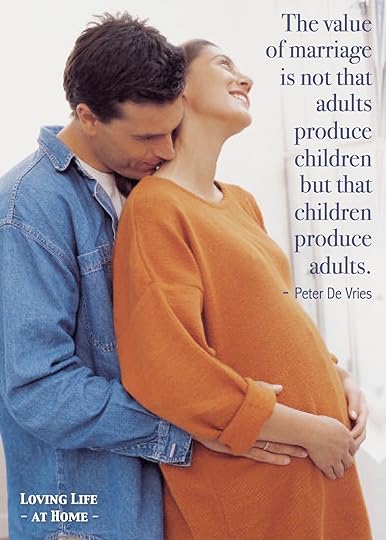 Peter DeVries once said, “The value of marriage is not that adults produce children, but that children produce adults.”
Peter DeVries once said, “The value of marriage is not that adults produce children, but that children produce adults.”
I think both processes are important, but have nonetheless found his point to be true. Having children does tend to mature us faster and better than we might expect to mature without them.
When my husband and I first married, the prevailing wisdom of the time was that a couple should wait five or six years before starting a family. They should get on their feet, perhaps buy a house, and certainly take time to get to know one another before bringing a baby into the picture.
Life didn’t work out that way for us.
God overruled any half-hearted attempts we considered making to prevent pregnancy (which were essentially none at all), and I conceived just two short weeks into our honeymoon.
Thus began our true metamorphoses into adults.
My husband and I were both firstborn, and we both had the stubborn, selfish, self-centered personality so often associated with that birth order. Thankfully, children have a way of working such things out of a parent. Of knocking off the rough edges. Of teaching us to put another ahead of ourselves. (The fact that we still struggle with selfishness at all — even after twelve children — is an indication of just how bad the problem was to begin with).
We have found that having children, having a lot of them, and having them early has been good for our mindset. It has caused us to look at the world differently, giving us a heightened awareness of danger and a fierce desire to protect our little ones from any and every threat, be it physical, spiritual or philosophical in nature. It has shifted our focus away from self.

From the moment I first found out I was expecting, motherhood has compelled me to consider carefully the foods I eat, the hours I sleep, the words I speak, the books I read, and the company I keep. It has forced me to think through where to store cleaning supplies, sharp objects, fragile heirlooms, and photo albums. It’s helped me remember to take my vitamins. It has kept me on my knees in prayer.
 Having babies has been good for my marriage, as well as my mindset. Not only has being a parent changed the way I look at the world, but it has changed the way I look at my husband.
Having babies has been good for my marriage, as well as my mindset. Not only has being a parent changed the way I look at the world, but it has changed the way I look at my husband.
I never knew how much I love him, until I saw how much he loves them.
As newlyweds, we were told that we should get to know one another before having a baby. In reality, having a baby allowed us to get to know each other in a way that wouldn’t have been possible without the baby.
Watching my husband kiss and cuddle and coo over our firstborn simply melted my heart. (He has done this with every one of our babies, to the same effect).
Hearing him spontaneously break into song — usually some silly rhyme or nonsensical verse he composes on the spot, such as “Oh, my smokin’ goodness, this little baby is a toodness” — has never failed to bring a smile to my face or to theirs.
I’ve enjoyed watching him teach our children to tie their laces and scramble eggs and ride a bike and swing a bat and start a lawnmower and drive a car.
I’ve admired his clear instruction, his boundless energy, his patience, and his sense of humor.
I’ve watched my husband keep vigil over a sick child, have marked the concern in his eyes, have heard him pray earnestly on their behalf. When at 23 months, our first son was diagnosed with Type 1 diabetes, he spent a week at Children’s Medical Center in Dallas, and Doug never left his side.
My husband works tirelessly, gives lavishly, and loves wholeheartedly. He walks in integrity (Prov. 20:7), and his wife and children are blessed because of it. He chooses to do the right thing and to do it faithfully, even when his motives are misunderstood and his sacrifices unappreciated.
Watching the way Doug parents, seeing the tender care with which he leads our family, has filled my heart to overflowing with a deep, abiding love and appreciation for the magnificent man I married.
And so, on Father’s Day (and the day after, and the day after), I want to honor the father of my children and to thank him for his willingness to be a father twelve times over (or more, should God so bless).
Thank you, Doug Flanders. I love you dearly. It’s been great growing up together.








June 1, 2013
A Hero in the Making
When my husband and I were first married, we had more time than we had money, so our gift giving often consisted of poetry, songs, or short stories we had written for one another. Here’s the poem I wrote for Doug 25 years ago this month, in honor of his first Father’s Day.
A Hero in the Making
There are little eyes upon you,
And they’re watching night and day;
There are little ears absorbing
Each and every word you say;
There are little hands, so eager
To do everything you do,
And a little boy who’s dreaming
Of the day he’ll be like you.
You’re the little fellow’s idle,
You’re the wisest of the wise;
And he knows that he can trust you,
Like he knows the sun will rise;
He believes in you completely,
Holds that all you say and do
He will say and do in just your way
When he’s all grown up, too.
There’s a wide-eyed little fellow
Who believes you’re always right,
And his ears are ever list’ning
As he watches day and night.
You are setting an example –
Every day in all you do –
For the little boy who’s waiting
To grow up to be like you.
– Jennifer Flanders
(June 1988)








May 17, 2013
What Spiders Know that Moms Forget
 Moms are amazing. They birth babies. They make milk. They keep their household humming.
Moms are amazing. They birth babies. They make milk. They keep their household humming.
But spiders are pretty savvy, too. They spin silk. They weave webs. They provide for public pest control.
I’m not saying spiders are smarter than moms, but many mothers — myself included — could learn a few things from spiders in general and from one spider in particular: Charlotte A. Cavatica, the extraordinary and especial friend of Wilbur the Pig.
Life is Full of Changes
The sooner we accept this fact, the better. Seasons change. Circumstances change. Friends come and go. We grow older. Children leave home. Time passes. There is no stopping it.
Charlotte lived her life to the fullest, savoring the small pleasures each day presented. She chose to be grateful for what she had instead of resentful over what she lacked. Shouldn’t we do the same?
“Don’t cry because it’s over, smile because it happened.” – Dr. Seuss
The Work Never Ends
A spider doesn’t build one web and expect it to last forever. She knows her work must be done and redone (sort of like laundry and housecleaning), and she labors at it without complaint.
This is the nature of both life and work: both call for much repetition. Grumbling about that fact does not make the tasks any easier.
“Work hard and cheerfully at whatever you do, as though you were working for the Lord rather than for people.” – Colossians 3:23
Calm Begets Calm
When Wilbur first learned that he was destined for Zuckerman’s dinner table, he went immediately and understandably berserk. His hysterics might have worked the entire farmyard into a frenzy had Charlotte’s coolheaded composure not diffused the situation. Her confident reassurances helped soothe the pig’s nerves and settle him down.
That’s the sort of woman I want to be: not one who is easily agitated or upset, but one whose presence calms and comforts everyone around me.
“Be like a duck. Calm on the surface, but always paddling like the dickens underneath.”
– Michael Caine
Worrying Won’t Solve Anything
Worrying may be many mothers’ modus operandi, but it accomplishes nothing except to make yourself and everyone around you miserable. And to what end? “Which of you, by worrying, can add a single moment to your life?” (Luke 12:25)
Charlotte told Wilbur — just as Jesus tells us — to STOP worrying. She would save him; he needn’t fret or despair. She suggested Wilbur attend instead to matters over which he exercised some measure of control: he should eat well, chew slowly, get plenty of sleep, and keep fit (all very good advice, indeed).
She assured him it would all work out. She would find a solution. He could sleep in peace. And to the degree he was able to trust her promises, Wilbur was able to rest undisturbed.
“Be anxious for nothing; but in everything by prayer and supplication with thanksgiving let your requests be made known unto God.” – Philippians 4:6
Patience Is a Virtue
Charlotte was no slacker. She was a meticulous craftsman, versatile and industrious. She knew how to work.
But she also knew how to wait. She didn’t expect immediate results or instant gratification. Even after her web was spun and her trap was set, she realized it might be awhile before some stray bug became ensnared in it. But she was content to wait. She was patient.
She tackled Wilbur’s problem in that same methodical, unhurried manner. She thought about it. She mulled it over. She gave it careful consideration. She slept on it. She hung upside down, so her blood would go to her brain, and patiently waited for an idea to come. She fully expected a solution would eventually occur to her. And in time, it did.
We live in a culture that worships speed. We want everything, and we want it now. But faster is not necessarily better. Those things we gain instantly and with little effort are seldom as satisfying as those for which we must work and wait.
Waiting builds patience. Patience is good. And the most important things in life take time.
“Patience and perseverance have a magical effect before which difficulties disappear and obstacles vanish.” – John Quincy Adams
Mind What Matters Most
Like other spiders, Charlotte could spin silk with five times the tensile strength of steel (pound for pound). With it, she constructed webs that were absolute marvels of engineering. With the webs, she fought against all manner of menaces to society: pesky flies, disease-spreading mosquitoes, and various other annoying insects.
But unlike other spiders, Charlotte was also a good speller. She wrote words that attracted the attention of folks far and wide. The messages she worked into her webs were photographed and publicized in headline news. And the entire ploy allowed her to strategically and single-handedly save the life of her endangered friend.
Yet in Charlotte’s estimation, all her prior accomplishments paled in comparison to the importance of giving life to the next generation. She recognized that soft, white, inconspicuous egg sac for what it truly was — her most lasting achievement, her greatest work, her magnum opus.
And here again, Charlotte was right on target.
“Many people want to leave a better world for their children. I’m trying to leave better children for my world.” – Carlos Slim
I had hoped to publish this post on Mother’s Day, but I was too busy mothering to finish it in time. Instead, I was taking family bike rides, cheering at basketball games, bandaging boo-boos, and tutoring math. I was folding laundry, preparing meals, sweeping floors, and shopping for groceries. I was reading stories, giving baths, rubbing backs, and singing lullabies. And I was spending alone-time with my husband, in hopes of maybe even conceiving again!
In other words, I was doing all those things mothers do that normally go unnoticed: Things that seldom make national headlines or attract public attention. Stuff that — unless I photograph, tweet, or update my status — won’t get liked on Facebook or pinned on Pinterest.
These tasks, taken individually, appear rather ordinary and mundane. But cumulatively, they amount to my most important work of all.
And doesn’t that job deserve to be done with my whole heart?
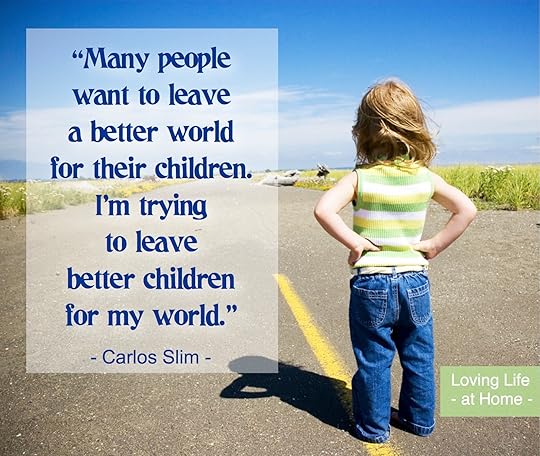








May 11, 2013
Lesson #6: God Wants the Whole Pie
 What follows is the sixth (and next-to-last) installment in the series “7 Life Lessons I’ve Learned from my Husband.” This concept is key to understanding the Christian walk.
What follows is the sixth (and next-to-last) installment in the series “7 Life Lessons I’ve Learned from my Husband.” This concept is key to understanding the Christian walk.
I grew up believing I should put God first in everything:
He wants the first part of my week, so I should attend church every Sunday.
He wants the first part of my day, so I should read my Bible each morning.
He wants the first part of my produce, so I should tithe on every penny I earn.
As with so many other matters, when I got married, my husband really challenged my thinking in this area.
It’s not that there is anything wrong with attending church or reading the Bible or supporting missions.
Quite the contrary.
But worship services and quiet times and charitable giving cannot be where it ends.
God should be more than the top item on my to-do list.
When we think in terms of putting God first, then by definition, something else comes next. It implies that once God’s been given His fair share, the rest of my resources are mine to do with as I please, to pour into family, job, hobbies, or whatever else might be on my list.
But that’s not entirely accurate. This whole hierarchical way of thinking is fundamentally flawed.
God will never be satisfied with a trifling token of our time and talents. Our service to Him should not be ranked alongside dental appointments and PTA meetings and Little League games — just one more thing packed into an already overcrowded schedule.
God transcends our to-do list, and our devotion to Him must be all-encompassing.
If life is a pie, God doesn’t just want the first piece. He doesn’t even want the biggest piece. He wants the whole thing.
But what does this sold-out sort of living look like? And how do we get from here to there?
We do it by following these five simple principles:
Love God with all your heart:
The Bible states our goal plainly: “Hear, O Israel, the Lord our God, the Lord is One. You shall love the Lord your God with all your heart, soul, and might.” (Deuteronomy 6:5)
Loving God with our whole heart does not mean we have less love left over for our fellow man, as if our love supply could be diminished or depleted. Rather, the opposite is true. Loving God wholeheartedly compels and enables us to love others as Christ loves them, which is why Jesus follows that first command with a second like unto it: “You shall love your neighbor as yourself.” (Mark 12:31)
As with the loaves and the fishes, when we give our love wholly to God, He multiplies and increases it many fold, so that there is an abundance of love left over to share with those around us in soul-satisfying ways.
Serve God with all your strength:
The Bible commands us to serve the Lord with gladness (Psalm 100:2) and with the strength that He provides.(1 Peter 4:11).
Unfortunately, Satan has duped us into believing that only certain activities “count” as “service” and that everything else is just stuff we need to rush through so that we can have more time for “real ministry.”
We live burdened down with guilt over all the things we are NOT doing, instead of viewing all the things we ARE doing as opportunities to joyfully serve, knowing that even washing dishes and folding laundry and changing diapers and chauffeuring children can be a spiritual service of worship and a sacrifice of praise when done “as unto the LORD” with a renewed heart and mind. (Romans 12:1)
Honor God in all you do:
As Christians, we have taken the name of Christ; let’s make certain we don’t do so in vain. We must live lives of integrity and sincerity, praying that the words of our mouths and the the meditations of our hearts would be acceptable to God. (Psalm 19:14) Our faith should not be superficial, but should sink deep into our beings, transforming and molding us into the image of Christ. If we belong to God, then everything we do should be done for His glory. (Romans 14:8, 1 Corinthians 10:31)
Acknowledge God in all your ways:
Our lives should point others to Jesus. In all our ways, we should make Christ known, and He will direct our paths. (Proverbs 3:6)
I do not know who wrote this little rhyme that I memorized in my youth, but it is just as convicting today as it was the first day I heard it:
You are writing a gospel, a chapter each day,
By the things that you do and the words that you say,
Men read what you write, distorted or true,
What is the Gospel according to you?
Trust God with all the details:
God has promised to “work all things together for the good of those who love Him,” (Romans 8:28) and He can be trusted to keep that promise. Time and again throughout scripture, we are urged to put our full trust in God, to depend fully on Him instead of leaning on our own limited understanding or putting our faith in human reasoning:
“Trust in the Lord with all your heart and do not lean on your own understanding.” (Proverbs 3:5)
“Trust in Him at all times, you people; pour out your hearts to Him, for God is our refuge.” (Psalm 62:8)
So, there it is. These are the areas that come to my mind when I think of handing all of my life over to God. What does sold-out living look like to you? I’d love for you to share your thoughts in the comment section below.

















